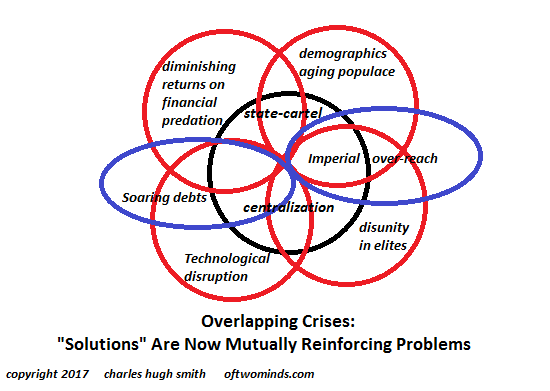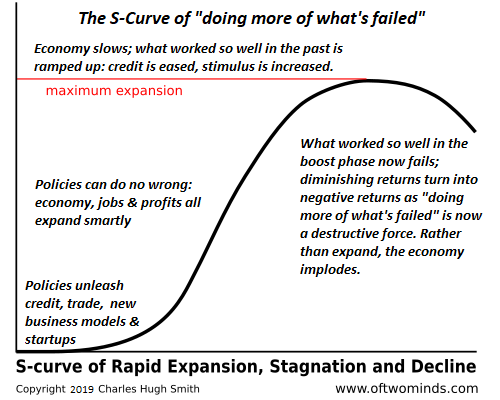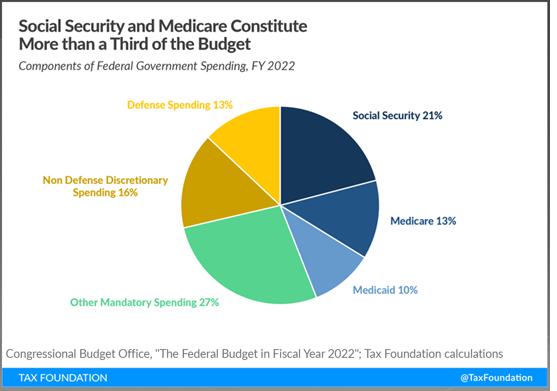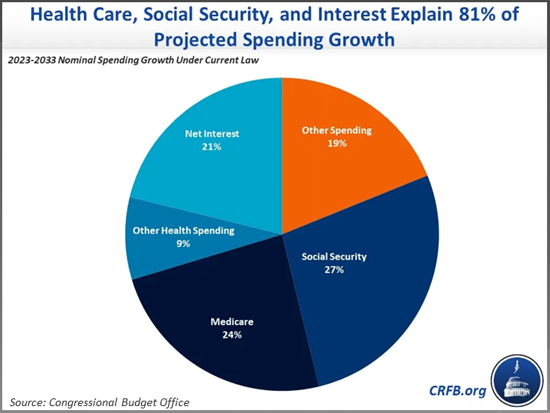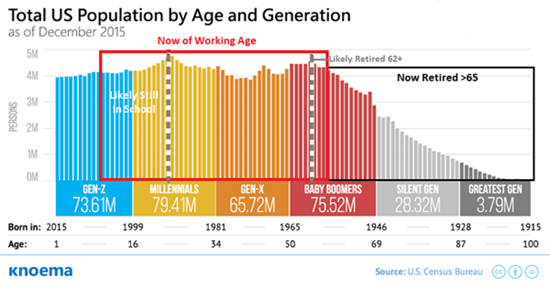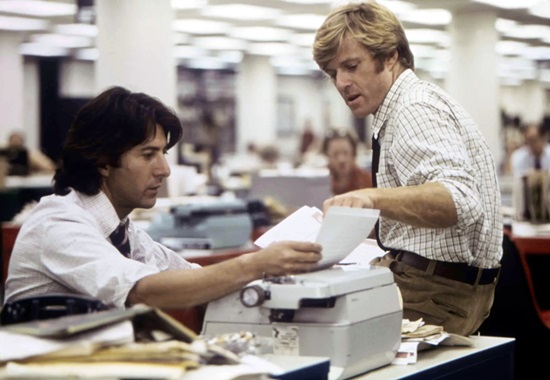I Want the "Rich Guys Internet"
Here's a quick outline of a "rich guys Internet", one where it costs money to participate but the payoff is a 10-fold improvement in the user experience.
That the Internet is now a toxic garbage dump is self-evident. Consider that
Cloudflare Reports that Almost 7% of All Internet Traffic Is Malicious.
This is akin to inflation, where the official 2.5% inflation rate has stripped us of at least 25% of the value of our wages--the cumulative impact is an order of magnitude greater than the headline number.
That 7% of malicious traffic--the toxic flood of spam, phishing, etc.--has degraded the user experience by 70%. Every user must expend sustained (and unpaid) effort--shadow work--to deal with the constant tyranny of hacks, patches, spam, phishing, SMS spam, changing passwords, etc., as well as the putrid sewage of intentionally harmful content.
Like fish slowly expiring in a toxic sea, we no longer even see what we're swimming in. Humans excel at habituating to the present, and so we've lost sight of how radically the Internet experience has changed in the past 25 years. We have lost track of how much of our time is now being squandered on shadow work to keep from being conned, defrauded, hacked, blackmailed, disrupted or poisoned on a daily basis.
This is the Internet's Garbage Time of History, and I want the "rich guys Internet", one stripped of all malicious traffic and garbage content. Impossible, you say? Not at all. Here's a quick outline of a "rich guys Internet", one where it costs money to participate but the payoff is a 10-fold improvement in the user experience.
The "rich guys Internet" (RGI) isn't intended to be a complete replacement of the Garbage Internet (GI); it's a secure compound for when we tire of the Garbage Internet. It's a second home that could be used as the primary residence should you choose.
1. No anonymity. Every participant has to have a verified human identity, the same procedure required to open a cryptocurrency trading account now: photo of the individual holding their passport, verified bank account, etc. Yes, yes, I can hear your screams: without anonymity, the black drones of the Globalists / Deep State will be hovering over my office within hours. Fine. You can keep your anonymous accounts in the GI (Garbage Internet). It's your choice.
And let's face it--if the black drones really want to find out who you are, that's no problem. Anonymity is nothing more than a thin veil. Our "protection" boils down to not being worth their attention.
Without anonymous accounts, there is no garbage. Nothing is allowed into the RGI (rich guys Internet) except traffic linked to a verified user. No more spam, phishing, etc. Any account linked to malicious traffic is immediately closed and the miscreant banned for life.
2. No data collection, none. No data collection is allowed. No trackers, cookies, nothing. Participants and content providers must agree to no data collection or they're excluded. In other words, no surveillance capitalism.
3. Organic search only, no "sponsored" anything. Search is search, not marketing in the guise of search. Search results are based solely on relevance, no gamed / paid placement. No ads on search results, either.
4. No ads anywhere. All ads are stripped from content.
5. Fees are paid to content providers for "clean" content. Any content provider who wants access to the RGI has to strip all content down to basic HTML. This reduces the potential for malicious leakage.
6. Encryption, triple firewalls, the works. The RGI is slower because the pipe from the Garbage Internet is narrow and it takes time to make sure nothing malicious is allowed in.
7. An RGI social media platform: no ads, no trolling, no algorithms, no garbage. Less "entertaining" perhaps, but if you want to be deranged, there's always the GI.
8. Secure email for users only. No ads, no spam, only messaging within the secure confines of the RGI.
9. High fees. You get what you pay for. Let's say it costs $50 a month. That's three fast-food meals or movie tickets or two lunches at a cafe. Is that unaffordable? Compared to what? How much is your shadow work time and mental health worth?
10. It's your choice. Nobody's forcing anyone to pay up to enjoy the benefits of the rich guys Internet.
So hey there billionaires. Instead of squandering hundreds of millions on yachts, why not spend a few bucks and set up a rich guys Internet that's semi-affordable to the masses?
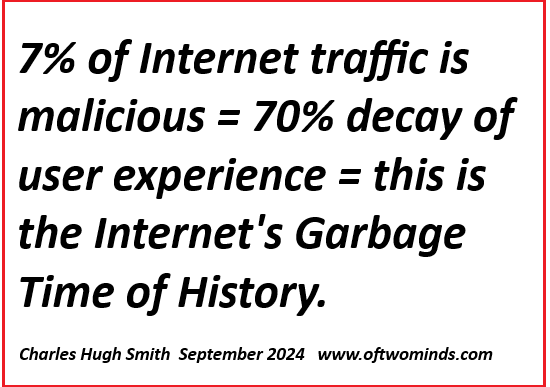
New podcast:
Is the Everything Bubble About to Pop? (37 min, 40 charts)
My recent books:
Disclosure: As an Amazon Associate I earn from qualifying purchases originated via links to Amazon products on this site.
Self-Reliance in the 21st Century print $18, (Kindle $8.95, audiobook $13.08 (96 pages, 2022) Read the first chapter for free (PDF)
The Asian Heroine Who Seduced Me (Novel) print $10.95, Kindle $6.95 Read an excerpt for free (PDF)
When You Can't Go On: Burnout, Reckoning and Renewal $18 print, $8.95 Kindle ebook; audiobook Read the first section for free (PDF)
Global Crisis, National Renewal: A (Revolutionary) Grand Strategy for the United States (Kindle $9.95, print $24, audiobook) Read Chapter One for free (PDF).
A Hacker's Teleology: Sharing the Wealth of Our Shrinking Planet (Kindle $8.95, print $20, audiobook $17.46) Read the first section for free (PDF).
Will You Be Richer or Poorer?: Profit, Power, and AI in a Traumatized World
(Kindle $5, print $10, audiobook) Read the first section for free (PDF).
The Adventures of the Consulting Philosopher: The Disappearance of Drake (Novel) $4.95 Kindle, $10.95 print); read the first chapters for free (PDF)
Money and Work Unchained $6.95 Kindle, $15 print) Read the first section for free
Become a $3/month patron of my work via patreon.com.
Subscribe to my Substack for free
NOTE: Contributions/subscriptions are acknowledged in the order received. Your name and email remain confidential and will not be given to any other individual, company or agency.
|
Thank you, Brooks W. ($70), for your wondrously generous subscription to this site -- I am greatly honored by your support and readership. |
Thank you, Steve T. ($70), for your superbly generous subscription to this site -- I am greatly honored by your support and readership. |
|
|
Thank you, Joseph E. ($7/month), for your marvelously generous subscription to this site -- I am greatly honored by your support and readership. |
Thank you, Mike K. ($70), for your splendidly generous subscription to this site -- I am greatly honored by your support and readership. |


















